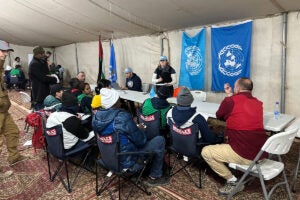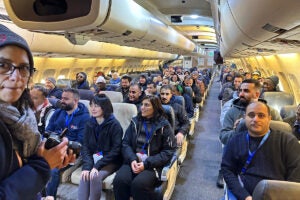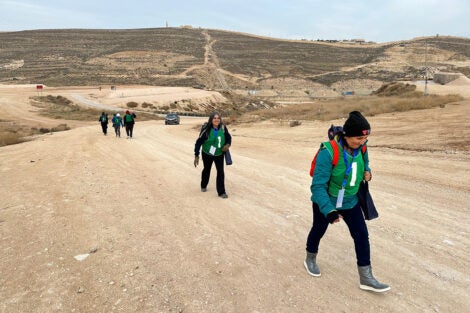Harvard Humanitarian Initiative collaborated with the World Health Organization to bring its humanitarian response intensive course to Jordan.
January 11, 2024 — With conflict and climate change-driven emergencies erupting around the globe, there’s an urgent need for more skilled professionals ready to respond to crises. The Harvard Humanitarian Initiative’s Humanitarian Academy has been preparing students with skills and practical experience to work in the field since 2004. Last month, organizers collaborated with the World Health Organization (WHO) to offer the complete course outside of the U.S. for the first time.
The course was held in Amman, Jordan, from December 3–12, 2023, at the invitation of the WHO Eastern Mediterranean Regional Office. Participants included 65 humanitarian professionals from 52 countries across the Middle East and Africa.

Like the original course, which is offered each spring in Massachusetts and is now open for registration, students spent class time learning key concepts in areas including human rights and international humanitarian law, in addition to practical skills for meeting the needs of populations in crisis. They then put what they learned into practice during an immersive three-day disaster and conflict simulation.
To ensure that the course was contextually appropriate, its HHI co-directors Sean Kivlehan and Michelle Niescierenko worked closely with WHO representatives to identify content experts and speakers from the region.

Adapting the simulation portion of the course from a state forest in Massachusetts to the King Abdullah II Special Operations Training Center (KASOTC), an urban installation in a desert environment, was complicated, said Kivlehan, an emergency physician at Brigham and Women’s Hospital and director of the Lavine Family Humanitarian Studies Initiative at Harvard. HHI, WHO, and KASOTC staff transformed the Center into a border region beset by disease, food shortages, and conflict. Jordan’s Center for Disease Control coordinated more than 100 student volunteers from local universities to role play the affected population, local officials, media, and others whom humanitarian workers would likely encounter in the field.
Kivlehan said that organizers were able to map all of the original simulation’s learning objectives onto the new environment, with the addition of one new scenario based on a unique KASOTC feature—a real airplane. Students “flew” to the simulated crisis-affected country and received their initial briefings on the way.
Bringing training to where it’s needed
Niescierenko, MPH ’15, a pediatric emergency medicine physician and director of the Global Health Program at Boston Children’s Hospital, took the humanitarian response intensive course as a student and is now a co-organizer. She said that the diversity of the participants in Jordan—and the experiences they were able to share with their fellow students—increased learning and enhanced the quality of the class.
Victor Tugumizemu was one of the course’s enthusiastic participants. He is the health information management and risk assessment lead of the emergency preparedness and response unit in the WHO Nigeria Country Office in Abuja. He has more than ten years of experience in humanitarian crisis response—including coordinating health care services and leading teams in conflict zones and natural disasters—but saw the course as an opportunity to enhance his skills and network.
“The course’s comprehensive curriculum, coupled with the wealth of knowledge shared by the course instructors and fellow participants, contributed significantly to my professional growth,” he said. “I’m eager to leverage these newfound connections and insights.”
Kivlehan said, “It has been a personal goal of mine to bring this training directly to those who can best use it, as opposed to having them come to us here in Boston. It was truly amazing to see it happen in a region where the needs are so acute and with such an incredibly diverse group of participants.” He said that HHI is looking at other opportunities to bring the course directly to more people around the world.
Co-directing the course on the WHO side was Samar Al-Mutawakel, lead of regional emergency health workforce in the WHO Eastern Mediterranean Regional Office. The course was a resounding success, she said, and she hopes to continue to build on it, given the evolving global landscape of public health emergencies and humanitarian crises. “We believe that by continuing to work closely with HHI, we can develop more robust and integrated response strategies that align with regional and global best practices. We are truly confident that our combined efforts will contribute to the overall strengthening of humanitarian response capabilities in our region.”
Photos: Courtesy of Harvard Humanitarian Initiative
